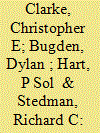|
|
|
Sort Order |
|
|
|
Items / Page
|
|
|
|
|
|
|
| Srl | Item |
| 1 |
ID:
127194


|
|
|
|
|
| Publication |
2014.
|
| Summary/Abstract |
The recent push to develop unconventional sources of oil and gas both in the U.S. and abroad via hydraulic fracturing ("fracking") has generated a great deal of controversy. Effectively engaging stakeholders and setting appropriate policies requires insights into current public perceptions of this issue. Using a nationally representative U.S. sample (N=1061), we examine public perceptions of hydraulic fracturing including: "top of mind" associations; familiarity with the issue; levels of support/opposition; and predictors of such judgments. Similar to findings on other emerging technologies, our results suggest limited familiarity with the process and its potential impacts and considerable uncertainty about whether to support it. Multiple regression analysis (r2=.49) finds that women, those holding egalitarian worldviews, those who read newspapers more than once a week, those more familiar with hydraulic fracturing, and those who associate the process with environmental impacts are more likely to oppose fracking. In contrast, people more likely to support fracking tend to be older, hold a bachelor's degree or higher, politically conservative, watch TV news more than once a week, and associate the process with positive economic or energy supply outcomes. Based on these findings, we discuss recommendations for future research, risk communication, and energy policy.
|
|
|
|
|
|
|
|
|
|
|
|
|
|
|
|
| 2 |
ID:
150038


|
|
|
|
|
| Summary/Abstract |
A growing area of research has addressed public perception of unconventional oil and natural gas development via hydraulic fracturing (“fracking”). We extend this research by examining how geographic proximity to such extraction interacts with political ideology to influence issue support. Regression analysis of data from a fall 2013 national telephone survey of United States residents reveals that as respondents’ geographic distance from areas experiencing significant development increases, political ideology becomes more strongly associated with issue support, with the liberal-partisan divide widening. Our findings support construal level theory's central premise: that people use more abstract considerations (like political ideology) the more geographically removed they are from an issue. We discuss implications for studying public opinion of energy development as well as for risk communication.
|
|
|
|
|
|
|
|
|
|
|
|
|
|
|
|
| 3 |
ID:
126244


|
|
|
|
|
| Publication |
2012.
|
| Summary/Abstract |
Recent national plans for recovery from bioterrorism acts perpetrated in densely populated urban areas acknowledge the formidable technical and social challenges of consequence management. Effective risk and crisis communication is one priority to strengthen the U.S.'s response and resilience. However, several notable risk events since September 11, 2001, have revealed vulnerabilities in risk/crisis communication strategies and infrastructure of agencies responsible for protecting civilian populations. During recovery from a significant biocontamination event, 2 goals are essential: (1) effective communication of changing risk circumstances and uncertainties related to cleanup, restoration, and reoccupancy; and (2) adequate responsiveness to emerging information needs and priorities of diverse populations in high-threat, vulnerable locations. This telephone survey study explored predictors of public reactions to uncertainty communications and reassurances from leaders related to the remediation stage of an urban-based bioterrorism incident. African American and Hispanic adults (N=320) were randomly sampled from 2 ethnically and socioeconomically diverse geographic areas in New York and California assessed as high threat, high vulnerability for terrorism and other public health emergencies. Results suggest that considerable heterogeneity exists in risk perspectives and information needs within certain sociodemographic groups; that success of risk/crisis communication during recovery is likely to be uneven; that common assumptions about public responsiveness to particular risk communications need further consideration; and that communication effectiveness depends partly on preexisting values and risk perceptions and prior trust in leaders. Needed improvements in communication strategies are possible with recognition of where individuals start as a reference point for reasoning about risk information, and comprehension of how this influences subsequent interpretation of agencies' actions and communications.
|
|
|
|
|
|
|
|
|
|
|
|
|
|
|
|
| 4 |
ID:
151702


|
|
|
|
|
| Summary/Abstract |
Risk management is a decision-support process and a vital tool for military planning and decision-making. Today, several nations utilize risk-based approaches to analyze the level of security in military operations. There are both strengths and challenges in applying risk-based approaches to support military decisions. In this article, the challenges related to risk communication are investigated with the aim of describing how a military organization should train to create a good environment for effective risk communication. The analysis finds that it is important for the organization to define and consistently use a shared risk understanding. Such a shared risk understanding will need a systematic development process that focuses on the future decision makers’ and analysts’ education and training. To reach understanding, all involved parties must have the chance to identify the problem, reflect on its implications, test different solutions and develop a solution.
|
|
|
|
|
|
|
|
|
|
|
|
|
|
|
|
|
|
|
|
|